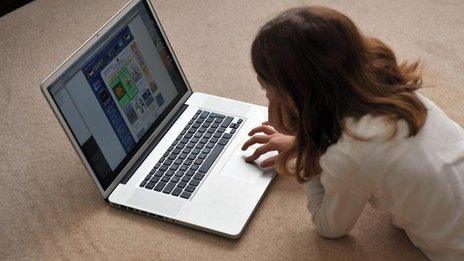School's out: Home education on the up in Wales
- Published
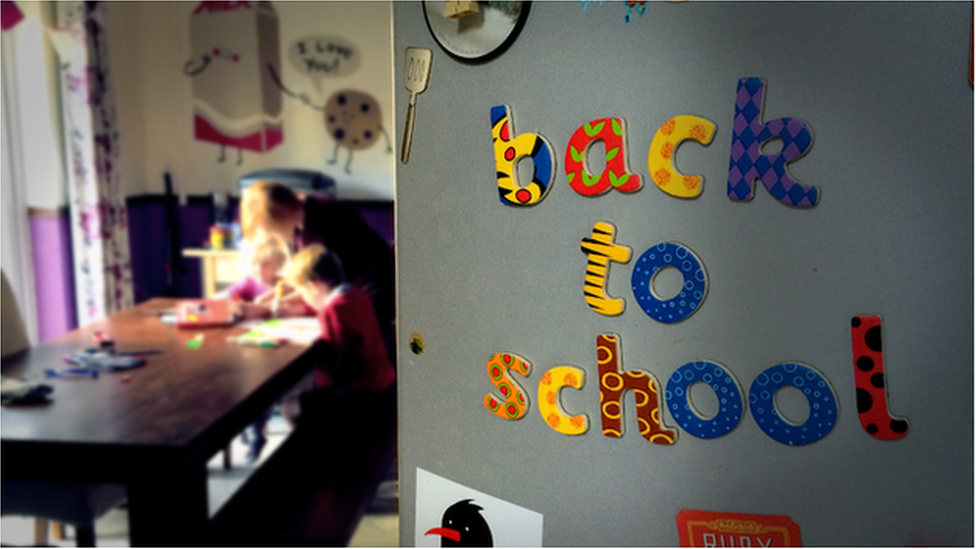
September is here and that means most parents will be shedding a tear - or heaving a great sigh of relief - as they send their children back to school.
But an increasing number in Wales are turning their backs on mainstream education, opting instead to teach their children themselves.
It is perfectly legal: the 1996 Education Act states that school-age children must receive an education "either by attendance at a school or otherwise".
But can mum or dad really do a better job than the professionals?
Eden Maurice has never set foot in a school. The 17-year-old, from Caernarfon in Gwynedd, was educated at home along with her three brothers.
"It was a really positive experience," she said. "I gained a lot out of it that I don't think I'd have got in school.
"We spent a lot of time outside, camping, kayaking and learning about botany. We did look at textbooks for subjects like history but we would supplement that by visiting castles and other old buildings."
Eden's parents, Julie and Ken, decided to give home education a try when their eldest son Tao was four.
"When he was about seven I gave him the choice of going to school but he didn't want to go," said Mrs Maurice. "By then I'd got the other three and when they reached school-age, their big brother was at home so they didn't want to go either.
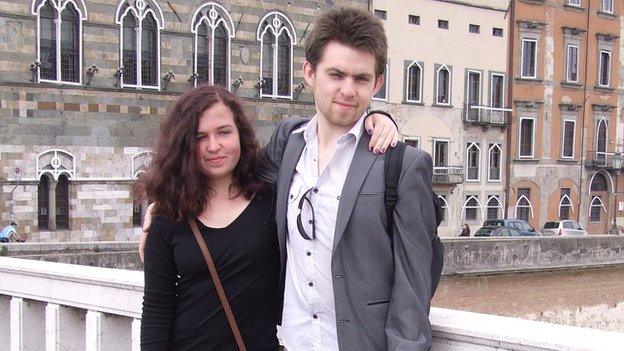
Eden and Tao Maurice: "We never missed out by not going to school."
"I had four different ages and four different interests to cater for so it wasn't easy. We ended up doing what I call seasonal education, where we worked indoors with books, worksheets and the internet during the winter and spent the summer outside, camping, walking and learning about nature. It worked really well."
It sounds idyllic but what about the national curriculum? What about GCSEs? Surprisingly, they are not compulsory for home-schooled children.
Tao, now 23, believes this freedom allowed him to flourish: "Having lots and lots of time to specialise was better for me than spending 20 hours a week doing religious studies and other stuff I'm just not interested in."
'Quiet revolution'
Once dismissed as a radical option practiced by hippies, hot-housers and religious fundamentalists, home education is becoming more popular - and more accepted - in Wales.
The Welsh government says 1,399 children were taught at home in the 2014-15 academic year - that is a 14% increase on last year and a 56% increase since records began four years ago.
The true number is likely to be even higher because unless they have withdrawn their child from school, parents do not have to tell the local authority that they are educating at home.
Mike Wood, who runs a website dedicated to home education, says a "quiet revolution" is under way.
"More and more parents are finding that it is possible to provide a suitable, flexible and enriching education tailored to their child's individual needs in a way that schools could not dream of providing.
"Schools are under pressure. Teachers have to follow a curriculum and have targets to reach and just don't have time to cater for each individual child. But parents can do that."
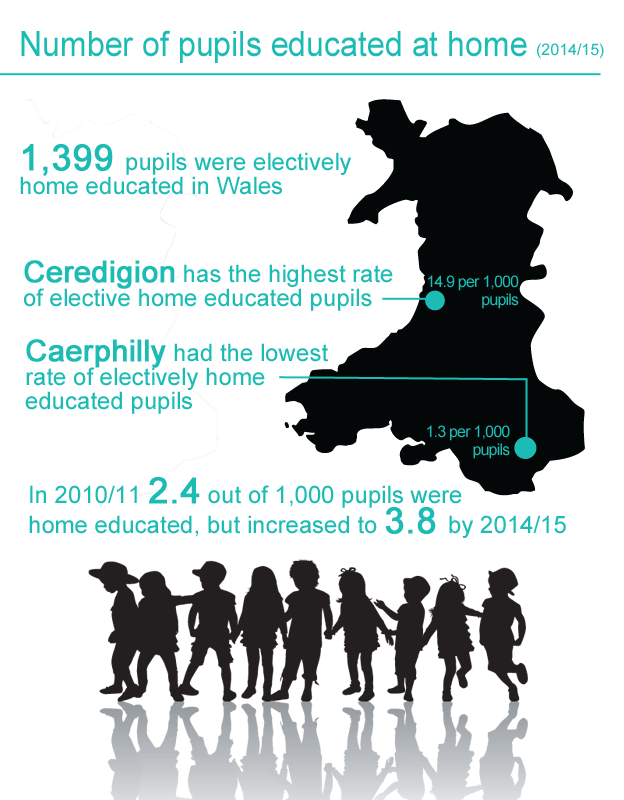
Source: Welsh Government
Bev Carr, from Brecon in Powys, who took her son Henry out of school at the age of five, agrees. "I think people are becoming more disillusioned with the education system and waking up to the fact that actually, I do have a choice."
Mrs Carr, a former teacher, educated Henry at home for a year after he became unhappy at school.
"I was gobsmacked at how easy it was to take him out of school. It was just a letter to the school and that was it.
"Home schooling brought him on in leaps and bounds. After twelve months, it brought his confidence back enough that we were considering mainstream education again."
The family found a local school which allowed Henry, now 9, to attend three days a week. The other two days are spent at home, learning with his mum.
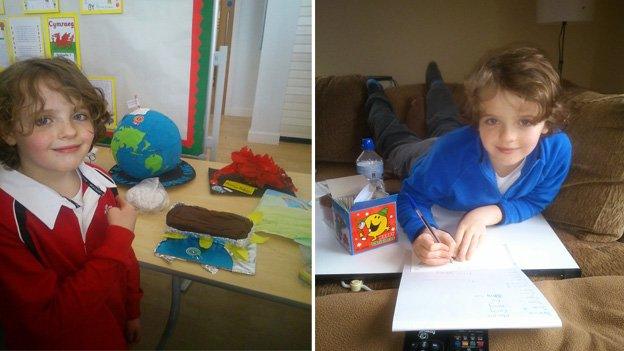
Henry Carr does 'flexi-schooling': three days in school and two days at home
"Henry is dyslexic and struggles to write things down," added Mrs Carr.
"I feel I can offer him the time and space he needs to record things in a way that suits him. For instance, we did a project on Brecon Castle and instead of writing all the information down, he made a YouTube video about it and presented it to his class the next time he was in school."
Socialisation
Mrs Carr feels flexi-schooling, as it is called, is vital to her son's development: "The three days he's in school, he's learning to be a sociable being. He belongs to a community and he's making friends. That would be more difficult if he was at home all the time."
Dr Philip Dixon, director of education union ATL Cymru, believes home-educated children miss out on important life skills. "Schools provide an atmosphere where children have to learn give and take, tolerance, and a respect for the views of others," he said. "They are a major means of socialising us for the future."
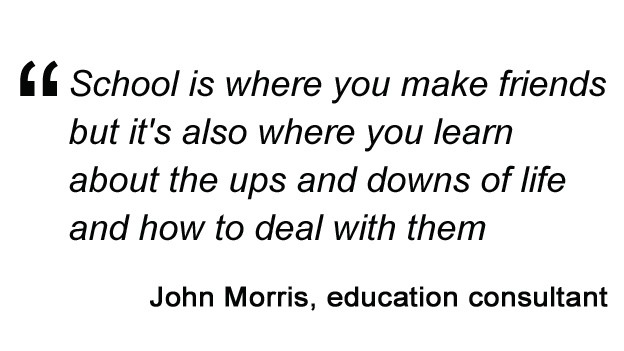
Wrexham-based education consultant John Morris agrees: "The problem for me is can parents manage the socialisation of their children?
"School is where you make friends but it's also where you learn about the ups and downs of life and how to deal with them effectively. If you don't have social integration, you don't learn those coping skills and I think that's a big issue."
But Tao Maurice scoffs at the idea: "Because everyone who goes to school obviously has very, very good social skills, right?"
Does he ever feel he missed out by not going to school? He is emphatic: "No, not at all."
His sister Eden insists that not going to school helped rather than hindered her: "I have a lot of confidence talking to people much older and younger than me and I think that's because I haven't just been in a classroom with people my own age. Home education is more like real life."
"People think it's about sitting around the kitchen table 'doing school' at home," said Mike Wood. "But quite often the education takes place out and about at museums, libraries, sports clubs or local home education groups. There are plenty of opportunities to socialise."
Guidance
In 2012, a Welsh government proposal to make the parents of home-schooled children join an official register and be subject to regular monitoring sparked a furious backlash. It was later scrapped.
Instead, Education Minister Huw Lewis wants to bring in new, non-statutory guidance for local authorities, to "help build consensus and trust" between them and home-educating families.
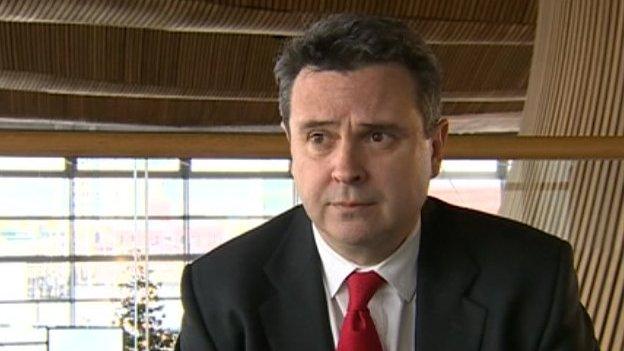
Education minister Huw Lewis wants to introduce new guidance for dealing with home-educating families
The guidance, which went out for public consultation earlier this year, recommends that local authorities should hold annual meetings with families to "consider evidence that a suitable education is taking place".
But it states that officers have no right to insist on this; by law, parents do not have to let them into their home.
It is not enough, according to Dr Philip Dixon: "At the very least the Welsh government's guidance should contain a requirement that home educators give regular, verifiable updates of their child's progress," he said. "Those who believe in home education should see that as an opportunity to show that their choice has been a reasonable one."
"The reason we are against monitoring is that it depends largely on how that local authority sees education," said Mike Wood. "Too often they employ ex-head teachers to oversee home education. We argue that they are often very poor at understanding how education works in the home environment.
"You've also got to remember that some people home educate largely because of problems they've had with the local authority or the local school over their child's education, so it would be extremely stressful for them to have assessors come into their home."
NSPCC Cymru/Wales also believes the guidance should be more robust: "Home educated children are at increased risk of becoming invisible to authorities," said a spokesman. "A small minority of families may potentially decide to home educate as a mechanism to conceal neglect and abuse.
We feel the guidance needs to be strengthened to assist local authorities to fulfil their safeguarding responsibilities towards children who are education at home."
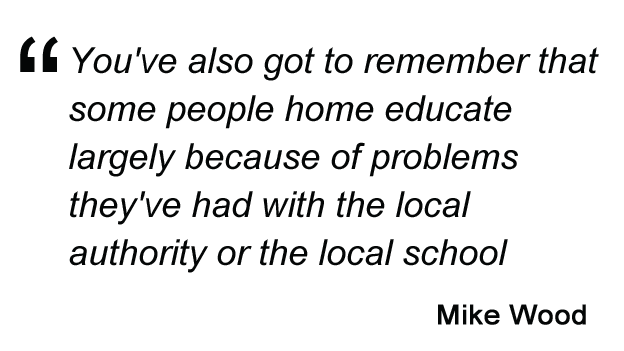
"Safeguarding is important but it's not a home education issue," said Julie Maurice. "That's tantamount to saying you need to register children at the weekend or during school holidays because they are with their families. Who safeguards them through the school holidays?"
A Welsh government spokesperson said an analysis of the consultation responses will be published in the autumn.
In the meantime, whatever your view, home education appears to have paid off for the Maurice family: Tao is doing a degree in cognitive neuro-psychology and hopes to become a surgeon and Eden is studying art and design and has her eye on a career in art therapy.
"Overall I think I've done pretty well," she said. "I love learning and I have a lot of motivation to do the work and meet deadlines.
"Most of all, I think home education gives you a really strong relationship with your parents that I'm not sure I would have had if I'd gone to school."
"There are a lot of things that are not necessarily positive about it," admitted Mrs Maurice, "We gave up a lot financially as we had to live on one wage and there's never a day off. Your whole life is geared towards educating your kids.
"But all my children are very individual and very free-thinking. They always say to me, 'If there's one thing you've given me mum, it's that I'm sorted in who I am.' And for me, that's what's important."
- Published6 May 2014
